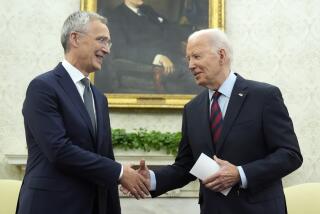Afghanistan needs firm security funding pledges, U.S. says
BRUSSELS — The United States and its allies are promising to provide more than $4 billion a year for Afghanistan’s army and police after international forces depart in 2 1/2 years, but they still lack firm financial pledges to meet the target, U.S. officials said.
As a result, Afghan officials fear that they won’t have the resources necessary to fight what is expected to be a still-virulent insurgency after most foreign troops withdraw by the end of 2014.
The escalating financial crisis in Europe and uncertainty about how long Afghanistan’s cash-strapped government will need major military aid are making it difficult to nail down contributions, U.S. officials acknowledged.
“We cannot shortchange the security that must be provided by the Afghans forces now and in the future,” Defense Secretary Leon E. Panetta said at a news conference here Wednesday after daylong meetings about the funding shortfall and other issues at NATO headquarters.
The meetings were unusual because Panetta joined forces with Secretary of State Hillary Rodham Clinton at the alliance headquarters. Their goal was to put finishing touches on the announcements that President Obama and other leaders intend to make next month at the North Atlantic Treaty Organization summit in Chicago.
Along with security funding, the White House plans to use the May 20-21 summit to unveil a long-term military alliance with Afghanistan. Officials also will disclose a separate agreement for the U.S. and its allies to shift from the lead combat role to a training and advisory mission by mid-2013, putting Afghan forces in the lead fighting position.
For Obama, the high-profile summit in his hometown is an opportunity to show Americans that he is wrapping up the unpopular, decade-old conflict in Afghanistan in the midst of a hard-fought reelection campaign.
U.S. officials say a small number of American troops will remain in Afghanistan after 2014 to provide training and to conduct limited counter-terrorism operations.
But the uncertainty about how much military aid Afghanistan will receive after U.S. troops leave is causing Afghan President Hamid Karzai to dig in his heels in negotiations with Washington over the terms of a long-term alliance.
Karzai said this week that the Obama administration needs to spell out in writing how much it would provide for the army and police after 2014, a demand that suggests he is increasingly worried about being abandoned once U.S. and allied combat troops depart.
Panetta said Karzai’s demand was impractical because it would trample on Congress’ prerogative to set aid levels in annual appropriations bills. With public support for the Afghanistan war dropping, Congress may decide to cut future funding for the Afghan army and police, no matter what the White House promises Karzai.
“We do not have the power to lock in money for the Afghans or anyone else,” Panetta said.
The U.S. is spending more than $9 billion this year to support Afghan security forces. After American troops depart, the administration is promising to pay $2.2 billion a year, more than half the amount that the U.S. estimates is needed for security.
The plan under discussion at NATO calls for allies to contribute at least $1.2 billion and Afghanistan to chip in at least $500 million. At that level, the army and police would shrink from a planned force of more than 300,000 to about 230,000, U.S. officials said.
Some Afghan officials worry that the Taliban, though weakened, could regain its strength once U.S. forces have withdrawn, especially because insurgent sanctuaries in Pakistan remain largely intact.
U.S. and NATO officials said Afghan troop levels could be revised upward if the insurgency does not wane. They also said they believe that the capabilities of the Afghans will improve in time, allowing the force to shrink while remaining effective.
“We believe we are on a path to ensuring that their security forces … will have the resources necessary to protect the Afghan state and the Afghan people,” Clinton said at the news conference Wednesday.
British officials pledged $110 million a year during the closed-door meetings, but they indicated that the money would not be available until 2015 or later, a senior NATO official said.
Other countries also announced a willingness to contribute, though they held off announcing specific amounts, U.S. and NATO officials said.
“We are in a time of austerity, particularly with European governments,” a senior U.S. Defense official said. “We’re moving toward [obtaining firm commitments], but there’s a long way to go yet.”
More to Read
Sign up for Essential California
The most important California stories and recommendations in your inbox every morning.
You may occasionally receive promotional content from the Los Angeles Times.











